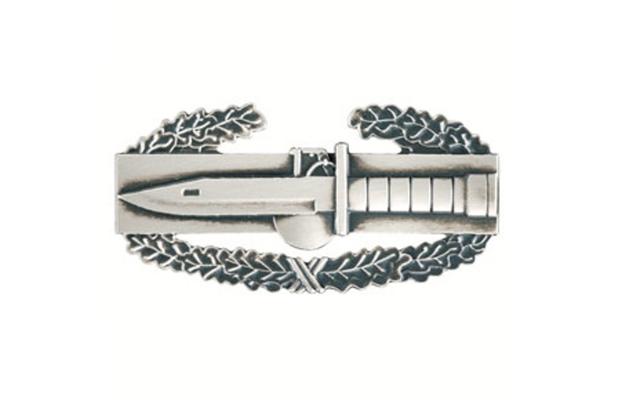Beginning in October 2019, the U.S. Army plans to require soldiers to compete for the Expert Action Badge, an annual physical and skill-based test similar to the prestigious Expert Infantryman Badge and the Expert Field Medical Badge.
"Right now, it's a concept that we have developed that is very similar to the EIB program for the infantry and EFMB program for the medics," Army Training and Doctrine Command's Command Sgt. Maj. David Davenport told reporters Friday.
The EAB will be discussed at an NCO Development Town Hall that Davenport will host March 30 at 11 a.m. Eastern Standard Time.
Since 1944, infantrymen have undergone EIB testing on an annual basis to prove their expertise in infantry skills such as land navigation, weapons knowledge and tactical skills. The ones that pass are awarded the EIB, which displays a silver musket on a blue rectangular background.
Beginning in 1966, combat medics began taking a similar annual test to prove expertise in wound identification, bandaging, removing casualties from combat vehicles and other skills that save wounded soldiers' lives on the battlefield. Like the EIB test, medics who pass receive the EFMB, which portrays a silver stretcher placed horizontally behind a caduceus with a cross of the Geneva Convention at the junction of the wings.
Both the EIB and EFMB have versions that are awarded for demonstrating these skills on the battlefield.
The Expert Action Badge would be generally for the remainder of the military occupational skills that don't have a formal way of certifying competencies like the EIB and EFMB, Davenport said.
"The idea was that you model the EAB program off of those two established programs," he said, describing that the test will consist of physical challenges such as the road march, the Army Physical Fitness test and the land-navigation test.
For the skill evaluation portion of the EAB test, the Army plans to have soldiers demonstrate expertise in the 39 Warrior Tasks and nine Battle Drills that all soldiers must know.
The design for the Expert Action Badge has not been approved, but Davenport said it will likely be based on the current Combat Action Badge, which portrays an M9 bayonet and an M67 fragmentation grenade with a silver wreath around it. The CAB was approved in 2005 as a combat award for non-infantry soldiers.
"All this is concept-based right now, so if you think about the prestigious Combat Infantry Badge and the Expert Infantry Badge … one has a wreath and one does not," Davenport said. "In concept … it's just removing the wreath from around the Combat Action Badge, so it will have the bayonet and the fragmentation grenade on there."
The plan is to have to EAB test administered at the brigade level. Units will be given a week to set up the test course, a few days to train for the test and a few days to actually conduct the test, Davenport said.
Davenport said he will answer questions about the EAB effort at the March 30 town hall, the fourth in a series of town hall meetings to discuss aspects of NCO 2020 Strategy. Soldiers can participate in the town hall by going to tradoc.army.mil/watch.
The meeting will also cover the Army's new Occupational Physical Assessment Test, which is designed to determine if new recruits and soldiers can meet the physical demands of certain jobs, such as infantry and armor specialties.
The town hall will also discuss how 2020 has been designated as the Year of the NCO and the Army's strategy to improve written and oral communication skills as part of the Noncommissioned Officer Professional Development System.
NCOPDS consists of both professional military education and civilian education but also doing jobs such as drill sergeant, recruiter and training with industry "to give that NCO a deeper and broader understanding of how our Army works," Davenport said.
-- Matthew Cox can be reached at matthew.cox@military.com.





























